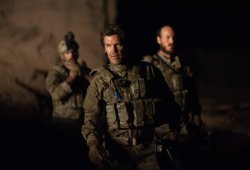 Richard Foreman Jr / Lionsgate
Richard Foreman Jr / Lionsgate“You’re asking me to explain a watch,” says Alejandro (Benicio Del Toro), when Kate Macer (Emily Blunt) asks him about the state of the Mexican drug cartels. Like Alejandro, Sicario doesn’t seem especially interested in explaining the exact tanglature of the web, preferring instead to map out one woman’s ensnarement within it.
“Sicario” is a Mexican term for hitman, deriving from the Hebrew word for Roman-killing Zealots. But it’s clear the word connotes more than just “hitman”—and throughout the movie, exactly who are the Zealots and who are the Romans is never clear.
Initially, Macer would seem the obvious choice for the term. Her FBI task force discovers a house whose drywall is filled with scores of corpses, and as they investigate the house, a booby trap kills two of her fellow officers. In response, she joins a special response team lead by Josh Brolin’s mononymic Matt. That team is composed of a dozen Delta force members just home from Iraq, as well as the mysterious Alejandro, who is aligned with the US government the same way a fighting dog is aligned with its handler. Macer asks Matt if the team will go after the people who were behind the murder house. His answer: “If you want to get the people who are really responsible—then yes, we’ll do that.” (Cryptic emphasis his.)
But what is the team’s objective? Where are their boundaries? And most of all, why do they want her, specifically? Macher spends the movie trying to unravel these questions.
Sicario is a spectacular thriller, but it is first a good movie, and a thriller second. In this respect, it’s got less in common with its alleged sister-films Traffic and End of Watch, and more with The Silence of the Lambs or No Country For Old Men. It’s possible to appreciate Sicario just as a thriller, but that would only just scratch the surface of the film. Like Silence of the Lambs, Sicario is a film about people without power navigating with and around those who have it; like No Country, it’s about a nation examining itself in the mirror.
Silence of the Lambs literalized the danger women face at the hands of men—there were strong parallels between Lecter’s attacks on men, Gumb’s preying on women, and the men who patronize and dismiss Starling. Sicario depicts Macer navigating a man’s world, but the threat isn’t exclusively male-on-female; her black partner, Reggie (Daniel Kaluuya), is dismissed out of hand by Macer’s teammates.
Later, one of the Delta team soldiers knocks Reggie onto his back and stomps his foot onto Reggie’s chest. “Shh, baby, don’t fight it,” the soldier says. “Just let it happen.”
The genius of the film is the way it constructs a parallel between Macer and Reggie’s disempowerment—at which we, the audience, will naturally feel anger or revulsion—and the same disempowerment of the movie’s “bad guys,” the low-level cartel members that threaten Macer’s task force. The film’s first real show-stopper of an “action scene” (if you can even call it that) involves the task force stopped at the border, waiting for the cartel ambush they know is coming.
In your run-of-the-mill action movie, this sequence might have thrown seemingly endless waves of so-called enemies at the task force, enemies that (“that,” not “who”—remember, in action movies, bad guys aren’t capital-P People) exist to be killed in increasingly cool and well-framed ways by the good guys.
In Sicario, the threat is two beat-up Honda Civics, filled with tattooed cartel thugs wielding pistols. (The strike team, outfitted with scoped and silenced fully automatic weapons, can only engage in response to aggression. Their anxious, excited waiting recalls the scene from Pulp Fiction where Travolta has his car keyed: “I wish I could’a caught him doing it . . . It’d been worth him doing it just so I could’ve caught him.”) This battle isn’t two equal sides pitted against each other: it’s strike teams in kevlar SWAT-getup piling out of six armored cars and exterminating eight T-shirted men in a matter of seconds.
 Richard Foreman Jr / Lionsgate
Richard Foreman Jr / LionsgateUltimately, Matt is willing to subjugate anything—the Constitution, the Mexican authorities, basic ethics, Macer herself—to ensure that “order” prevails. For Macer, order consists of adherence to principles; for Matt, it means knowing your side maintains control.
But what makes the movie great isn’t just that it presents an increasingly relevant intellectual dilemma. It’s how it makes the audience feel the tension viscerally.
Because when we go to the movies, we usually like the Matts—or Jack Bauers, or whoever Tom Cruise is this month, or Mel Gibson from Lethal Weapon. We like powerful men who will stand up and say “The rules be damned. I know what’s right.” We like this for a lot of reasons. It’s simple. It makes us feel like rules would never prevent others from keeping us safe. It always ends well for the heroes. It’s exciting.
So we’re expected to roll our eyes when Macer claims that Matt’s actions are unconstitutional. It’s like, “Come on, lady, please don’t slow down our movie. This isn’t The Firm. Get back to shooting people.” And by exploiting that default alliance between Matt’s perspective and the audience’s desires, Sicario forces the audience to confront its own biases as things spiral toward a violent end.
(I mean, put yourself in the place of the average target of Hollywood marketing, which might actually be you. Who are you siding with? The white male commander of a strike team who’s willing to get things done No Matter the Costs, or the traumatized woman who demands things be done By The Books? Note that in pre-production, producers desperately wanted Macer to be a man; it is extremely fortunate for the film that director Dennis Villeneuve shut them down.)
Like No Country For Old Men, Sicario concerns a kind of person who is increasingly out of place in America: the idealist. Macer arranges a meeting with her boss to discuss whether she’s overstepping her bounds. Her boss clotheslines her: “Do you think I make these decisions? Do you think I can organize a task force? These decisions were made far, far away, by people who were elected—not appointed. So I assure you, if you’re worried you’re doing anything inappropriate—you’re not.”
The scene is filmed from the opposite-top corner of the room, like security footage. You could be watching it on C-SPAN. The film clues you in: the events depicted are the responsibility of a nation whose greatest wish is, apparently, the sacrifice of rights and liberty for the sake of alleged security. After all, we keep electing these people.
 Richard Foreman Jr / Lionsgate
Richard Foreman Jr / LionsgateIt would be easy to discourse on the politics of Sicario, but that’d be both divisive and kind of irrelevant to its status as a movie. Sicario is a political movie, but it’s not about politics. There are too many movies in which you can almost hear the director’s voice from behind the camera: “Do you get it? Is the problem clear? Can you tell what I think?” Where characters and events are tools for evoking a certain thought in the audience.
Sicario isn’t one of those films. It cares more about the way a political dilemma affects people, and the way moral questions generate anguish within them. To depict this—not just the questions, but their effects on actual persons—and be smart, and beautiful, and enthralling for its entire runtime, is an exceptional achievement, and makes Sicario worthy of your attention.
Caveat Spectator
The movie is violent, but evocatively, not just explicitly. It bears a stronger resemblance to the pencil scene in The Dark Knight—more horrifying than the quantity of blood would suggest it would be. We see close to a dozen people murdered; there are sprays of blood, but the camera never lingers on entrance/exit wounds. Which is to say the movie is extremely violent but not gory at all.
We see some of the corpses found in the cartel’s murder house; they’ve been cut and mutilated, but the heads are covered with translucent plastic bags, lending the corpses a sense of surreal horror more characteristic of Hannibal than Eli Roth-ish gorexploitation.
A man and woman kiss passionately, but the moment quickly turns violent; again, a moment that’s more disturbing than the sum of its violent parts.
We see mutilated corpses hanging from a Juarez underpass; they’re nude. I don’t think I need to spell out the kind of nudity present on dismembered corpses (i.e. male, female, frontal, whatever), as if that, rather than the mutilation, were the disturbing or traumatizing bit.
A man threatens to have another man’s daughter violated. We are present at the moment a family is murdered; though we see none of the deaths, we see the aftermath. We hear how a cartel murdered a man’s family in detail.
There’s like two-ish-dozen f-words, and a smattering of other profanities; my recollection is that none are used in an explicitly sexual manner.
Jackson Cuidon is a writer who lives in New York City with his wife and dog. Sometimes he tweets @jxscott.












